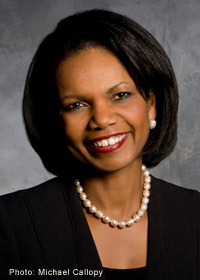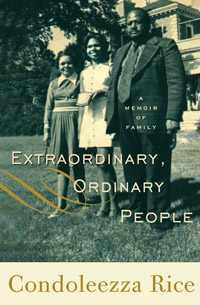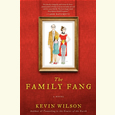Family Pride
Condoleezza Rice owes it all—her determination, her success, her quiet dignity—to her parents
John and Angelina Rice groomed their only child for an exceptional life. Condoleezza Rice’s new memoir, Extraordinary, Ordinary People, lovingly dedicated to her parents and her grandparents, is the former secretary of state’s testament to their strong values, “hard work, perfectly spoken English,” and, most importantly, their unrelenting focus on education. Her college-educated parents, Rice asserts, “were convinced that education was a kind of armor shielding me against everything—even the deep racism in Birmingham and across America.” The South’s pervasive racial prejudice gave Rice’s middle-class parents little choice but to “rigorously control their environment to preserve their dignity and their pride.”
 This upbringing may explain the central problem that dims Extraordinary, Ordinary People: in recounting her own early years, Rice retreats from any deeply personal or social introspection. Her reticence will most certainly spark acerbic commentary, especially among cable television’s pot-bellied punditry. Given the bloody events the Rice family witnessed (including the Birmingham church bombing that killed four little girls, Bull Connor’s fire hoses, and King’s assassination, to name a few), Rice herself seems oddly disengaged from the violent events of the 1960s. Her only rebellious act was to refuse, “in honor of Dr. King,” to attend a high-school debate competition in Montgomery two days after his assassination.
This upbringing may explain the central problem that dims Extraordinary, Ordinary People: in recounting her own early years, Rice retreats from any deeply personal or social introspection. Her reticence will most certainly spark acerbic commentary, especially among cable television’s pot-bellied punditry. Given the bloody events the Rice family witnessed (including the Birmingham church bombing that killed four little girls, Bull Connor’s fire hoses, and King’s assassination, to name a few), Rice herself seems oddly disengaged from the violent events of the 1960s. Her only rebellious act was to refuse, “in honor of Dr. King,” to attend a high-school debate competition in Montgomery two days after his assassination.
Rice’s apparent emotional distance from history may also be explained by her own focus and determination. She spent years pursuing, with exhaustive intensity, her own education—years that culminated in a Ph.D. (not the first for her family, as she proudly notes). She also spent countless hours in the solitary pursuits of ice skating and piano playing, activities which required fierce attention to detail and technique. How heartbreaking it must have been for Rice to realize, after years of dedication, that she would never be good enough for a career as either a skater or a pianist, but if she suffered any crisis in confidence, she doesn’t say. After a few “false starts” in other majors, she “wandered” into international politics, gained a degree in Soviet studies, forged a path to Stanford University, and, later, to the White House.
 This path is not the typical trajectory for a black intellectual of Rice’s generation, and the condemnation that Rice isn’t “black enough” is nothing new. But her memoir will provide fresh controversy. Many readers will be astounded, even outraged, by her statement that in Birmingham (later called “Bombingham”) the indignities of segregation “did not intrude every day and people lived good lives.” Some may find the “expansive social life” her parents enjoyed during Jim Crow an anomaly. Rice’s Republicanism (inherited from her father), and her alliance with both the Presidents Bush, has been fodder for newspaper columns for years. Rice sidesteps any direct answer to her critics, choosing to focus instead on the subject of her first chapters—“transformation through education” and the “message” to young black children: “There are no excuses and there is no place for victims.”
This path is not the typical trajectory for a black intellectual of Rice’s generation, and the condemnation that Rice isn’t “black enough” is nothing new. But her memoir will provide fresh controversy. Many readers will be astounded, even outraged, by her statement that in Birmingham (later called “Bombingham”) the indignities of segregation “did not intrude every day and people lived good lives.” Some may find the “expansive social life” her parents enjoyed during Jim Crow an anomaly. Rice’s Republicanism (inherited from her father), and her alliance with both the Presidents Bush, has been fodder for newspaper columns for years. Rice sidesteps any direct answer to her critics, choosing to focus instead on the subject of her first chapters—“transformation through education” and the “message” to young black children: “There are no excuses and there is no place for victims.”
Rice is forthright concerning what she terms “the complicated history of blacks and whites in America”: “Of course Jefferson had black children,” she snaps, recalling the “fuss” about Thomas Jefferson and Sally Hemings. And of her own white great-grandfathers, she states, “I just considered it a fact—no feelings were necessary.” Interestingly, Rice prefers the words “white” and “black,” eschewing the more politically correct “African American,” a term she believes “obscures” the issue of ancestral heritage and “recalls the immigration narrative.” “White” and “black,” she writes, “are starker and remind us that the first Europeans and the first Africans came to this country together—the Africans in chains.”
In the mid-1980s, Rice’s career was flourishing at Stanford University, and her account of those years brings real passion and exuberance to her narrative. She met General Brent Scowcroft, then Vice President Bush’s principal foreign-policy advisor. She served on corporate boards and local committees. She assumed more university work. Her tenure as Stanford’s provost was not without controversy, and more than once she was greeted by angry students protesting outside her office door.
She also took extended leaves to work in Washington. A quick study, Rice rose quickly in the White House ranks. Her resolve to speak her mind, ignoring the advice of seasoned White House staffers, garnered the respect and admiration of President George H. W. Bush. He coaxed Rice into “talk[ing] a little foreign policy” to his son, George W. Bush, then governor of Texas, who was already eyeing his own run for the White House.
Days after the historic—and controversial—2000 presidential election, Rice’s beloved father died, but not before learning of his daughter’s appointment as national security advisor. Rice closes her memoir by remembering the feeling of her parents’ presence as she walked through the door of her office in the West Wing of the White House. A second memoir detailing her years as secretary of state is all but certain.
Condoleezza Rice will discussExtraordinary, Ordinary People at Davis-Kidd Booksellers in Memphis on November 3 at 6 p.m.


